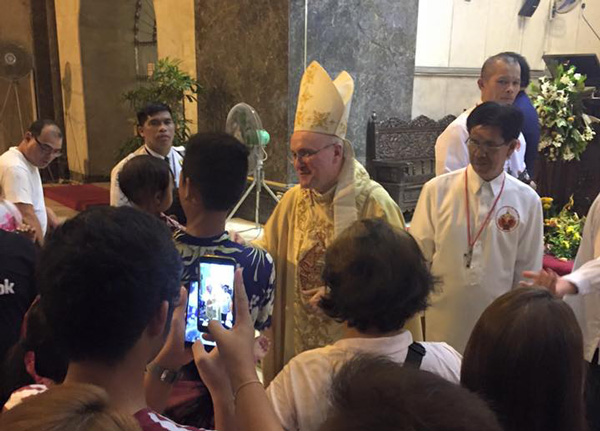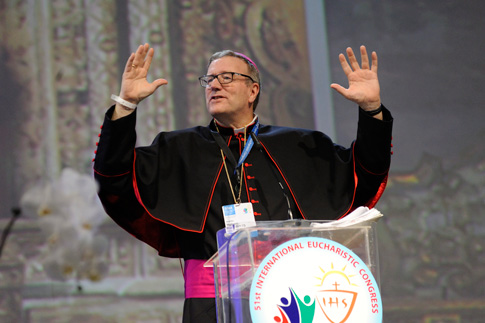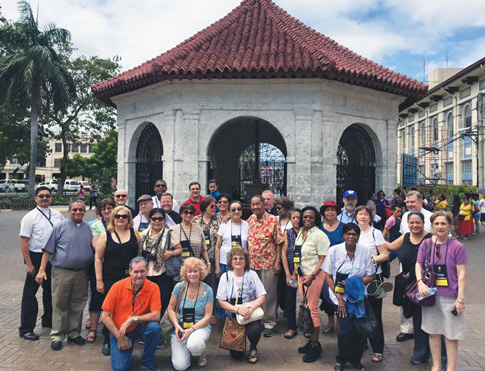By Simone Orendain

CEBU, Philippines (CNS) – Los Angeles Auxiliary Bishop Robert Barron said popular culture’s message of individuals being “infinitely right” is “repugnant to (Catholics’) eucharistic faith.” But he also said Christianity is “running on fumes” as it tries to counter the trend of people leaving the Church or staying away from the Eucharist.
“To stretch out like someone dying of hunger is the right attitude toward the Eucharist,” Bishop Barron said at the 51st International Eucharistic Congress. “What’s sad today is so many in the Catholic world have become blasé about the Eucharist.”
The bishop said only 30 percent of Catholics in the United States actually receive Communion, calling this a “disaster.”
At a news briefing after his presentation at the congress, he said that, unlike the German philosopher Friedrich Nietzsche’s ideology of selfinvention, Catholic faithful “did not invent (their) own story, we belong to a story” and that is “God’s drama.”
Bishop Barron – author of numerous books and a longtime faculty member, then president of Mundelein Seminary, major seminary of the Archdiocese of Chicago, Ill. – said the call of the Church today is to retain Catholics and attract new ones.
“If the church can’t find a way to tell that story in a theo-dramatic way, people will drift away to this easy selfinvention philosophy,” he said. “So it is a real challenge to the church. … We’ve got to be bold. We’ve got to be confident. We’ve got to be smart.”
Patrician Brother Peter John Hayes of Ballyfin, Ireland, was in the crowd of about 12,000 who listened, took notes and clicked cameras as the bishop drove home the message of the Eucharist as a meal, a sacrifice and “the real presence” of Christ.
Brother Hayes told Catholic News Service the problem of dwindling numbers of those taking the Eucharist has been on his mind. “When you wonder, ‘What do we have to do? What can we do? What can I do? … At an event like this … we get it that some of us are on the same road, anyway,” said Brother Hayes.
The bishop used a reading from the Gospel of St. Luke as an example of the two disciples who did not realize that the risen Lord was right next to them on Easter.
Bishop Barron said they were “walking the wrong way,” turning away from God as everyone does, since people are all sinners. And that made it hard to recognize Jesus in their midst. But once they heard His words and were compelled by the power of His life, then begged Him to stay, He shared a meal with them and gave the same command He had given the night before He died, “Do this in memory of me.”

People ignore Jesus’ commands all the time, said Bishop Barron, but “over the centuries that one dominical command has been massively obeyed.” That revelation of the pattern of Jesus’ life in the breaking of the bread is the moment the faithful “get it” and are no longer walking the wrong way, he added.
The bishop highlighted the Eucharist as a sacrifice, a theme that he said was the least-known and least developed.
Bishop Barron emphasized that God does not need the sacrifices of the faithful because he “doesn’t need anything,” but by returning something to God, they “are united to him.”
The 51st International Eucharistic Congress kicked off Jan. 24 with Pope Francis’ representative, Cardinal Charles Bo of Yangon, Myanmar, declaring war on poverty.
“The Eucharist calls for … a third world war against poverty,” said Cardinal Bo, “a third world war against the cruelty of dogs getting fed with sumptuous, organic food, while poor children scramble for scraps from the table.”
Tens of thousands of people waited at least an hour under a punishing sun to attend the opening Mass led by Cardinal Bo at the Plaza Independencia in Cebu. He opened his homily with a plea for the crowd to “be patient with the heat.”
“Soon it will be all right. The moon is too hot in Cebu,” the cardinal quipped, as the sun was just minutes from setting.
For a couple of hours, until the seats were opened up to the public, Lermalyn Otida, an office worker from Cebu, stood outside of the fenced-off area that enclosed seating for delegates.
With greetings in the Visaya dialect and the national language of Tagalog, Cardinal Bo told the faithful that Pope Francis loved them “very much.”
He called Filipinos the “beacon of Catholicism” to the world, saying that having a Philippine presence in. any country means there will be Catholicism. Close to 10 million Filipinos live and work outside the Philippines, with most practicing their Catholic faith, often in countries that do not have majority Christian population.

Cardinal Bo remarked on the Philippine church and its people being “the only church in the world that welcomed” priests from his country, which he said was a “suffering church” for more than five decades under military rule.
“You have shared the bread of hospitality, the bread of knowledge, the bread of your love.”
Cardinal Bo said the Eucharist strips the faithful of their social status, as people of all walks of life take Communion.
“The Eucharist calls us to justice. No other religion elevates justice to this level. No other religion elevates the poor to this level,” he said. He called it the major challenge in a world that “kills children in the womb” and “spends more on arms than on food.”
The cardinal emphasized that the mystery of the Eucharist is twofold: presence and mission. The Eucharist is the true presence of Jesus, while it was the mission of the faithful to share that presence with others.
“From eucharistic celebration to eucharistic commitment: mission,” he said.
Cardinal Bo said being devoted to eucharistic adoration was good and so was being devoted to Santo Niño, the child Jesus, a strong devotion in Cebu.
“Christ is calling us to be disciples, to carry His cross,” he said. “The Mass of the devotee ends in an hour, but the Mass of the disciple is unending. The Eucharist of the devotee is confined to the clean altars of the church. The Eucharist of the disciple continues with the streets as altar.”
Once the sun had fully set and Mass ended, fireworks exploded in one section of the sky above the plaza.
After the Mass, Sacred Heart Sister Yasuko Taguchi of Sapporo, Japan, a delegate from her country, put her hand on her heart and told CNS, “We are so, so, so overcome by this wonderful opening Mass.”
She said she was struck by the cardinal’s homily, the music and “everything.”
Sister Taguchi said it reminded her that when Christ died, he “left himself as a legacy for reconciliation and love and sharing and caring for one another. He is not here, but he is here. He is risen in us. … This (Mass) brought us such a realization, that He is here present among us … this was possible only in the Philippines.”
Diane Abigail Canate, 17, a college student from the neighboring island province of Leyte, called Cardinal Bo’s message “inspiring.”
“He said that Filipinos have really strong faith in God by what we witness today,” she told CNS.
Cebu Archbishop Jose Palma welcomed Cardinal Bo at the start of the opening Mass with a reference to the Congress’ theme.
He said, “Indeed it is perhaps symbolic that we open this 51st International Eucharistic Congress here at Plaza Independencia as we proclaim true independence by acknowledging our total dependence on Christ, recognizing that Christ crucified and risen is truly in us, our hope of glory.”
